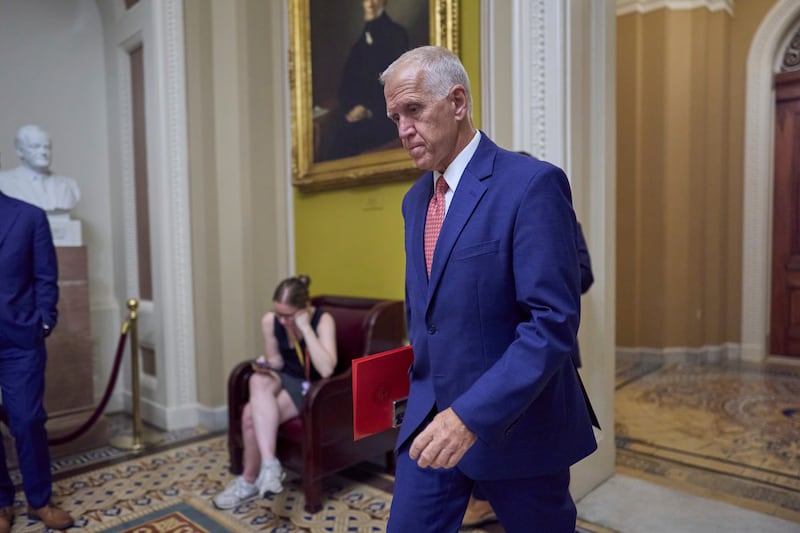WASHINGTON — North Carolina Sen. Thom Tillis announced he would not run for reelection next year just one day after President Donald Trump threatened to primary the incumbent for his objection to Trump’s massive tax package.
Tillis revealed his decision in a lengthy statement on Sunday, acknowledging that he has been weighing whether to retire over the last year — even joking with his colleagues that he wasn’t “excited” about the prospect of campaigning for another six-year term.
Ultimately, Tillis said it “was not a hard choice” to opt for retirement and spend time with his family over “navigating the political theatre and partisan gridlock in Washington.”
“In Washington over the last few years, it’s become increasingly evident that leaders who are willing to embrace bipartisanship, compromise, and demonstrate independent thinking are becoming an endangered species,” Tillis said in a statement.
“Democrats recently lost two such leaders who were dedicated to making the Senate more of a functional and productive legislative body. They got things done. But they were shunned after they courageously refused to cave to their party bosses to nuke the filibuster for the sake of political expediency.”
Tillis was likely referring to former Democratic-turned-independent Sens. Kyrsten Sinema and Joe Manchin.
“It underscores the greatest form of hypocrisy in American politics. When people see independent thinking on the other side, they cheer. But when those very same people see independent thinking coming from their side, they scorn, ostracize, and even censure them.”
Tillis’ exit makes him the latest senator to leave Congress citing frustrations with the difficulty of bipartisanship, particularly during the Trump era.
Former Sen. Mitt Romney of Utah noted similar disappointment with the current political arena, telling reporters in September 2023 that the Republican Party is “in the shadow of Donald Trump,” who he acknowledged was the “leader of the greatest portion of the Republican Party.”
In his farewell address, Romney lamented “the scourge of partisan politics (that has) frustrated repeated efforts to stabilize our national debt” — a message eerily similar to Tillis’ current fight with members of his own party in recent weeks.
Tillis has long been a holdout on the GOP-led tax package, citing concerns with proposed cuts to Medicaid in order to pay for $4.5 trillion in tax cuts at the end of this year. As a result, the North Carolina senator voted against advancing Trump’s “big, beautiful bill” in a late-night vote on Saturday, angering the president who quickly called for primary challengers against Tillis.
While Tillis did not name Trump in his decision to retire, he hinted at a lack of debate in his party without fear of retribution.
“I look forward to having the pure freedom to call the balls and strikes as I see fit and representing the great people of North Carolina to the best of my ability,” Tillis said.
Tillis’ retirement sets the stage for what is likely to be one of the most competitive and expensive races of the 2026 cycle. Tillis’ seat was already considered to be one of the most vulnerable next year, so his absence from the ticket gives Democrats an opening to flip a coveted seat as they seek to regain control of the upper chamber.
“Thom Tillis’ decision not to run for reelection is another blow to Republicans’ chances as they face a midterm backlash that puts their majority at risk,” Maeve Coyle, a spokesperson for the Democratic Senatorial Campaign Committee, said in a statement. “Even Tillis admits the GOP plan to slash Medicaid and spike costs for families is toxic – and in 2026, Democrats will flip North Carolina’s Senate seat.”
Meanwhile, in a statement by South Carolina Sen. Tim Scott, chairman of the National Republican Senatorial Committee, he didn’t mention Tillis.
“President Trump has won North Carolina three times, and the state’s been represented by two Republican Senators for over a decade. That streak will continue in 2026 when North Carolinians elect a conservative leader committed to advancing an agenda of opportunity, prosperity, and security,” Scott said.


